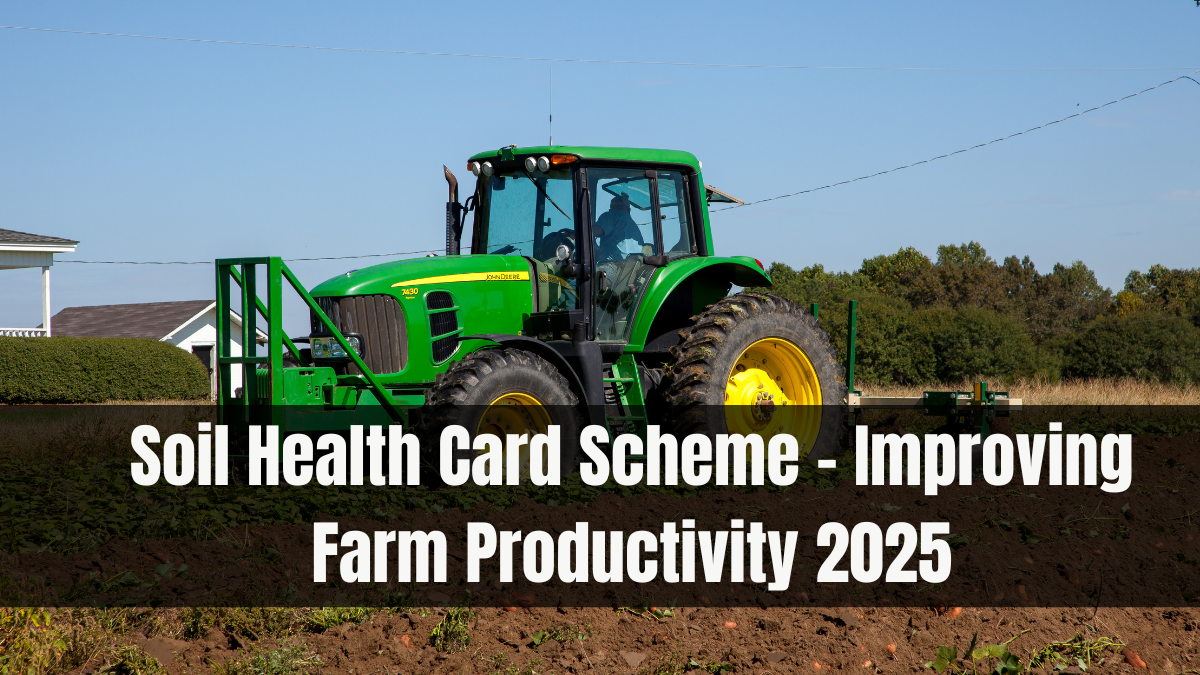The soil health card scheme is revolutionizing Indian agriculture by providing farmers with crucial insights into their land’s nutrient status. Introduced by the Government of India in 2015 and enhanced through 2025, the scheme empowers farmers to make informed decisions about fertilizers, cropping patterns, and soil treatment methods.
As of 2025, the initiative continues to strengthen rural agriculture by improving crop yield, promoting sustainable practices, and reducing input costs. The government has rolled out advanced digital tools and increased outreach in rural belts, ensuring every farmer understands the health of their soil before sowing.

What Is the Soil Health Card Scheme?
The soil health card scheme is a flagship initiative by the Ministry of Agriculture and Farmers Welfare that provides individual farmers with a comprehensive report on their soil quality. The card includes data on:
-
Nitrogen (N), Phosphorus (P), Potassium (K) content
-
Micronutrients like zinc, iron, and manganese
-
Soil pH level, salinity, and organic carbon presence
-
Fertilizer recommendation based on soil health
Each card is specific to a particular landholding and is valid for 3 years. It guides farmers on using balanced fertilizers and minimizing overuse of chemicals that harm the soil.
Key Features of the Soil Health Card in 2025
With continuous enhancements, the soil health card scheme in 2025 now includes:
-
QR code-based digital SHC linked to the farmer’s Aadhaar
-
Integration with Kisan Call Centres for expert advice
-
Real-time SMS alerts on fertilizer suggestions
-
24-parameter soil testing in upgraded labs
-
Access via the Soil Health Management App
These innovations help bridge the knowledge gap and bring precision farming directly to smallholder farmers.
How to Get a Soil Health Card
Farmers can obtain their soil health card through both online and offline channels. Here’s a step-by-step process:
Offline Process:
-
Visit the nearest Krishi Vigyan Kendra (KVK) or agriculture office
-
Fill out the SHC application form
-
Submit details of landholding and crops grown
-
Soil sample is collected by trained personnel
-
Testing is conducted in nearby soil labs
-
Card is issued with detailed analysis and recommendations
Online Process (2025 Portal):
-
Register using Aadhaar and mobile number
-
Provide land details and crop data
-
View your digital card within 15 days of testing
Cards are available in regional languages and are regularly updated after each testing cycle.
Benefits of the Soil Health Card Scheme
The soil health card scheme provides tangible benefits that support both economic and ecological sustainability:
-
Increased crop productivity by 10–15% in tested zones
-
Reduced cost of cultivation by 15–20% through efficient fertilizer use
-
Promotes organic farming and improves long-term soil fertility
-
Helps avoid overuse of urea, reducing soil and water degradation
-
Supports crop diversification by matching soil capability to crops
States like Maharashtra, Uttar Pradesh, and Tamil Nadu have reported massive improvements in farm output since adopting SHC-led practices.
SHC Coverage & Targets in 2025
| Year | Soil Samples Tested | SHCs Issued | States Covered |
|---|---|---|---|
| 2023 | 5.6 million | 4.9 million | 28 |
| 2024 | 6.2 million | 5.4 million | 31 |
| 2025 | 7.5 million | 6.8 million | All 36 |
The Ministry aims to issue fresh cards to over 7 crore farmers in the 2025–2026 cycle, covering even the remotest villages with mobile testing vans.
Challenges in Implementation
While the soil health card scheme is impactful, it faces some challenges:
-
Shortage of trained soil testing staff in some rural areas
-
Limited awareness among farmers on how to interpret the report
-
Delay in card delivery due to logistic gaps
-
Inconsistent data entry in earlier cycles
However, these issues are being addressed in 2025 through digital tracking, centralized data systems, and local training camps.
FAQs
What information does a Soil Health Card provide?
It includes nutrient levels, soil pH, organic matter content, and tailored fertilizer recommendations for your farm.
How often should a soil test be done?
Once every 3 years is recommended, or after major crop changes or land development.
Is there a fee for the SHC?
No, the service is free of cost for farmers under the government scheme.
Can I apply for SHC without land documents?
Basic landholding details are required, but Aadhaar and local verification usually suffice.
What is the benefit of using SHC data?
Farmers can reduce fertilizer costs, increase productivity, and ensure long-term soil health.
Click here to know more.
